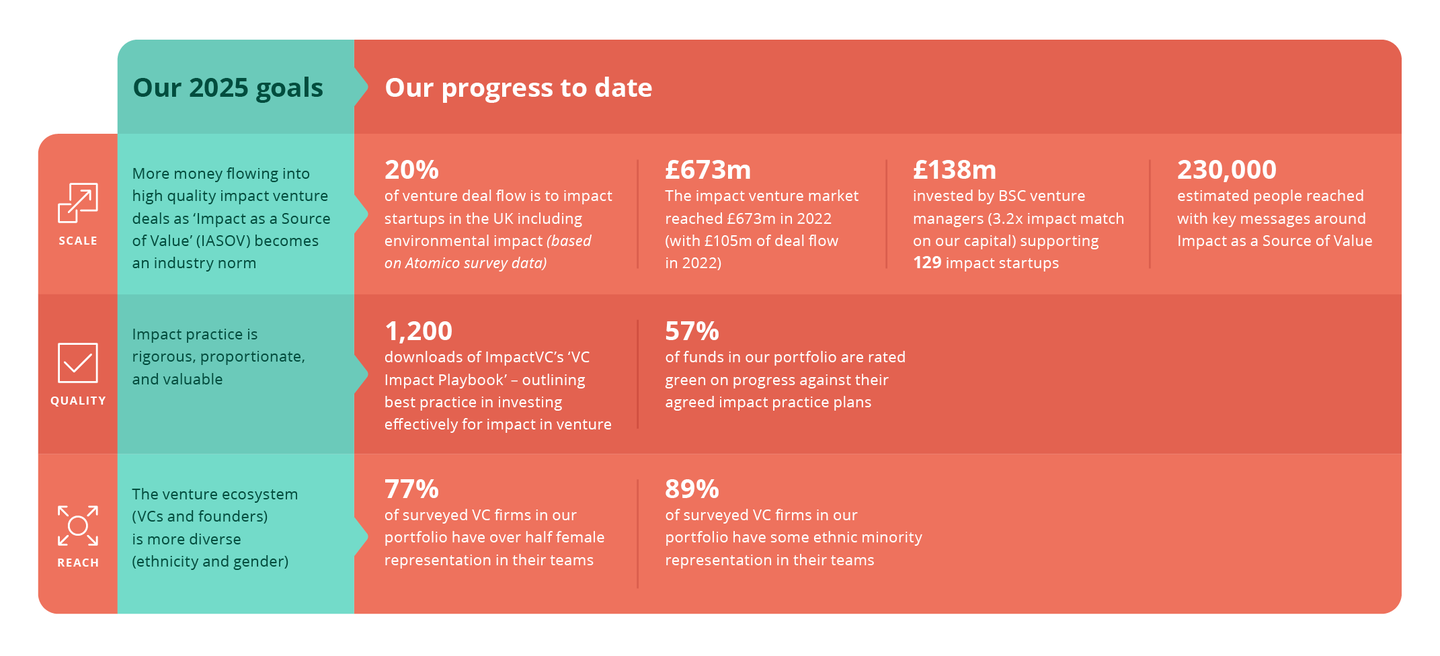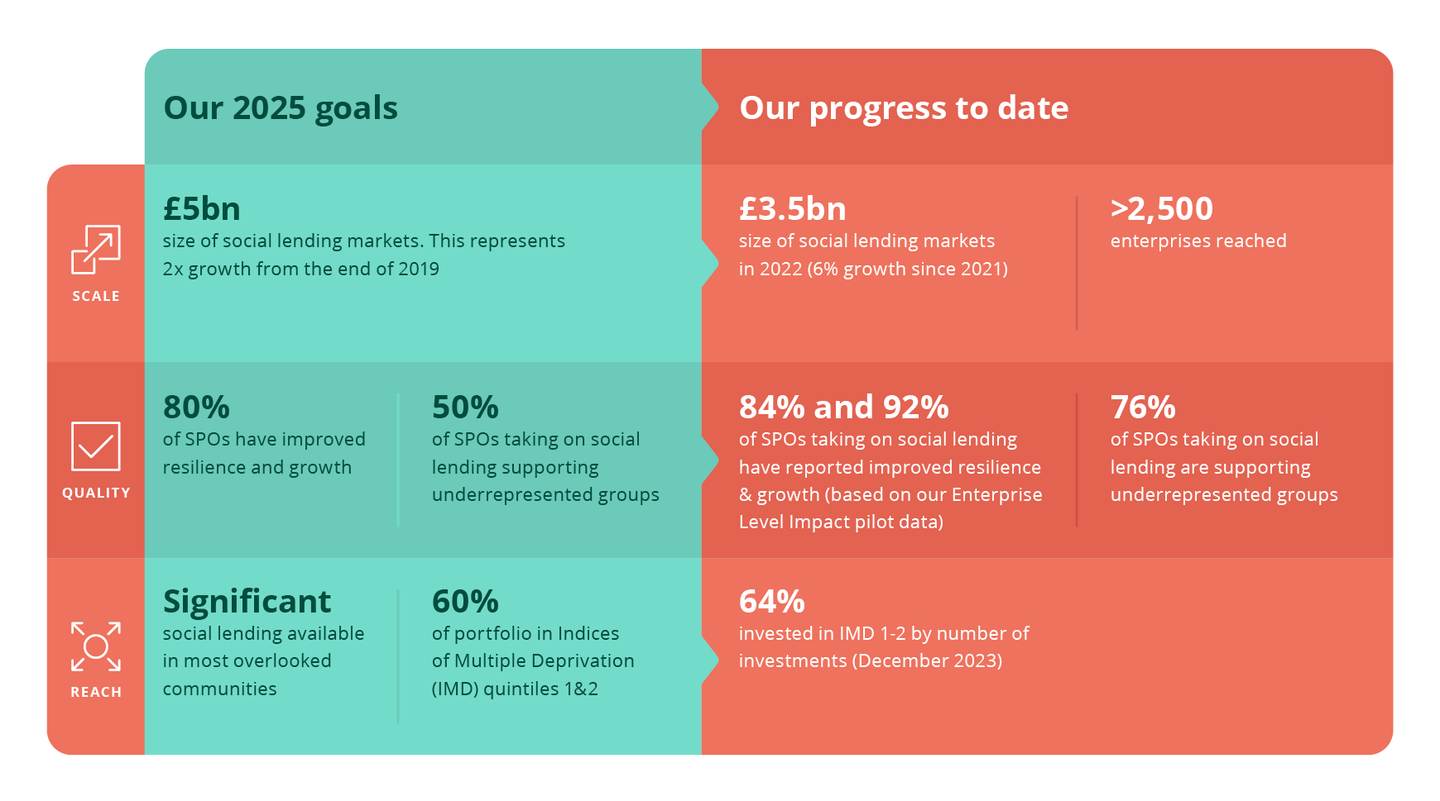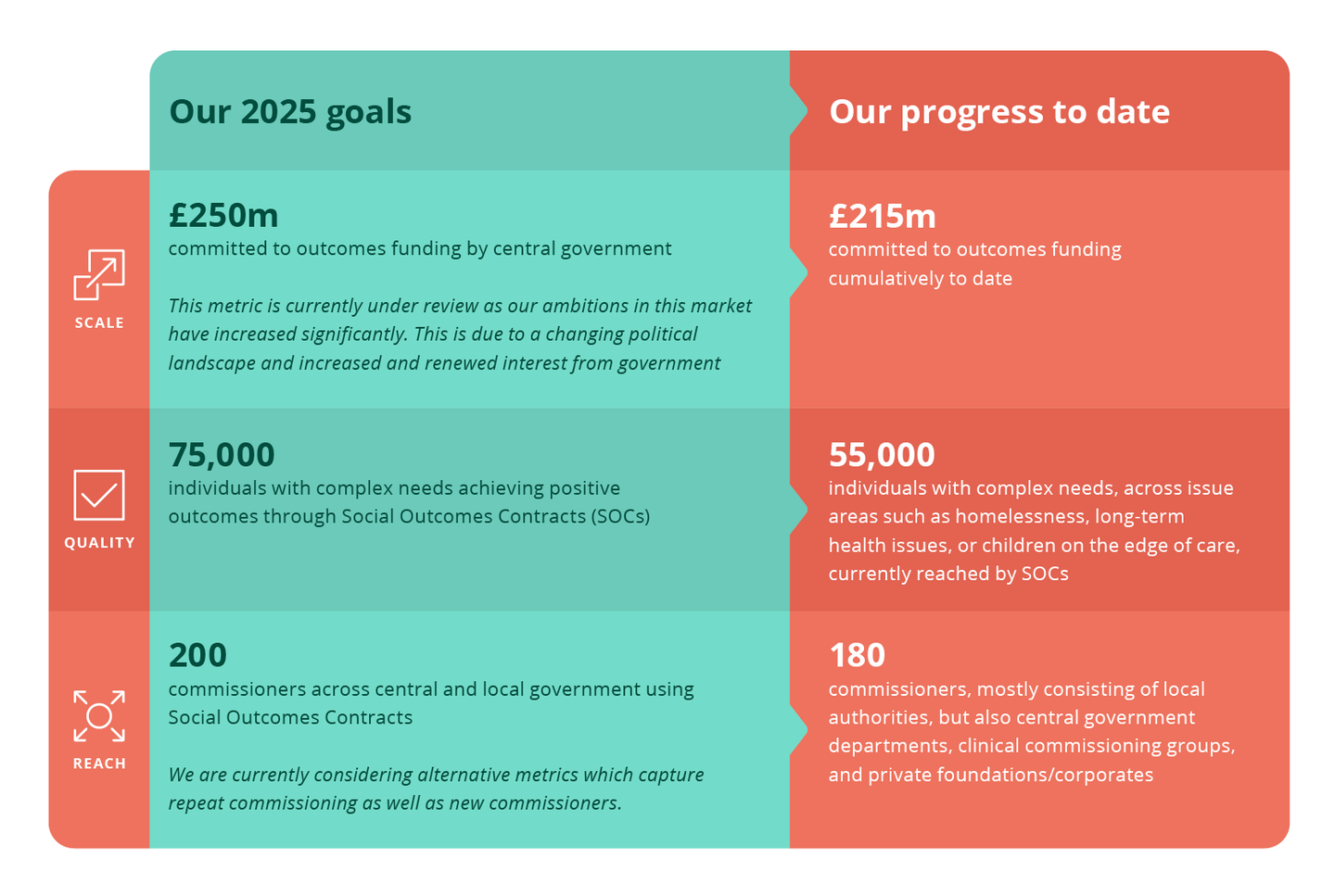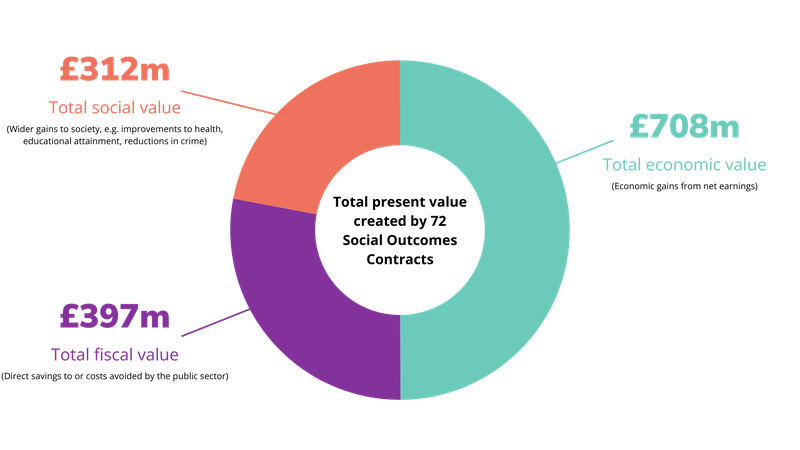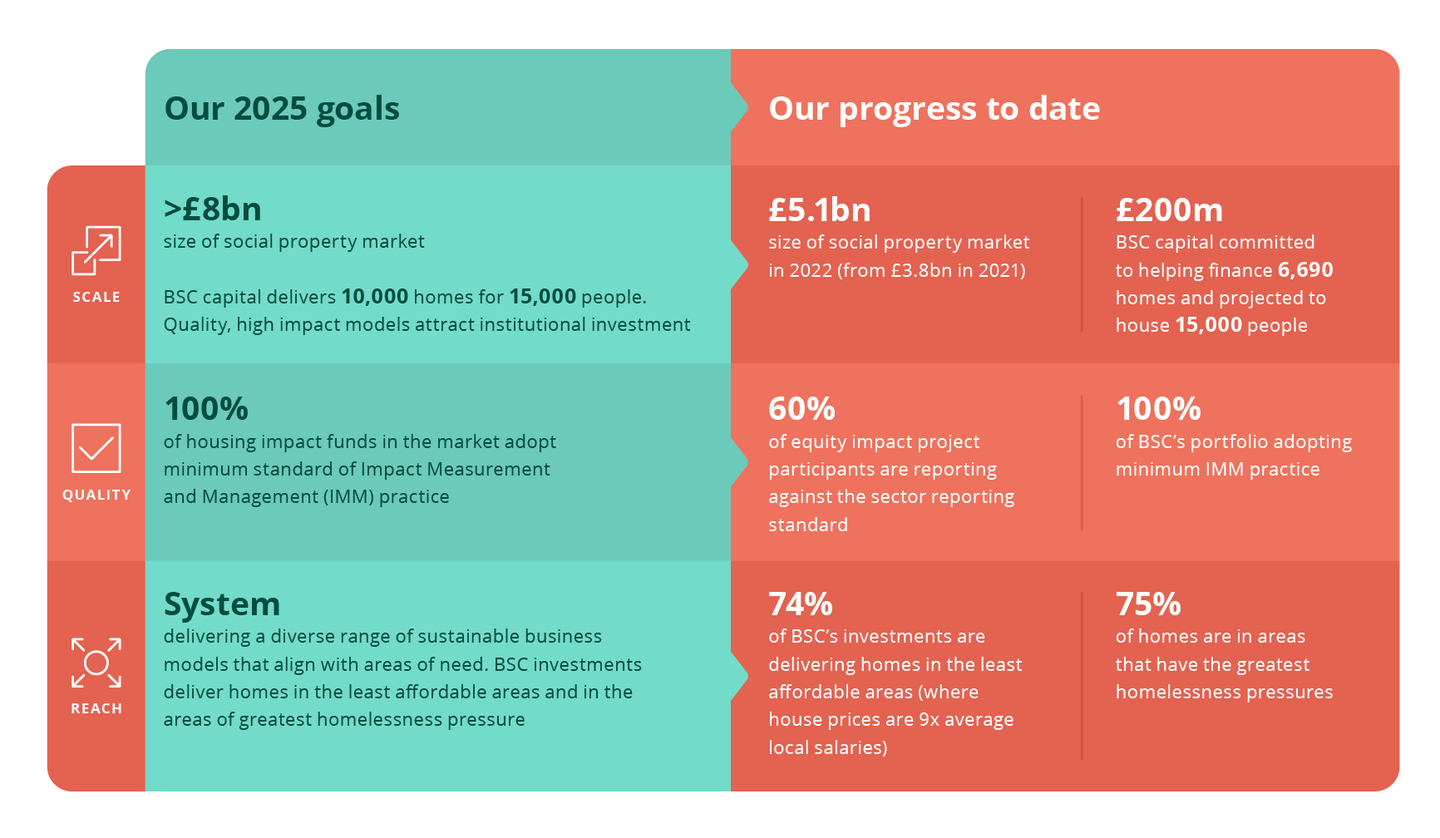Market Building and Investing
Delivering on our Theory of Change: BSC’s 2020-25 Strategy
Our 2025 strategy builds upon our Theory of Change and what we have learned in previous years. It focuses on building four market systems where there is greatest potential for scale of impact and where we believe we can make the biggest difference. This section goes into more detail on our market building and investing activities in each of these market systems. It also provides a summary of the progress we have made, and what we have learned in each of the four market systems against the goals and KPIs we set as part of our initial theories of transformations for each market system.
Impact venture
Helping build a venture market that nurtures and scales innovative ways of tackling social problems
We are building a venture market that nurtures and scales innovative ways of tackling social problems. Tech can drive impact at huge scale, quickly, tackling problems in ways other solutions cannot. We believe that tech-enabled business models have the potential to transform the lives of many people. These organisations deliver impact across key areas such as health, financial inclusion and education, employment & training.
There are various changes that need to happen to realise this opportunity. Many of these involve a change of mindset towards generating meaningful impact alongside strong returns, and impact as driving value is necessary. The practices that sit behind that – developing understanding and implementation of impact practice that is valuable and proportionate. We believe these changes will help to tilt the venture ecosystem towards impact, enabling business model innovation that delivers on the impact potential of ventures.
Market-building in impact venture
To fully unlock venture capital’s impact potential a number of obstacles need to be addressed. Currently there isn’t sufficient capital flowing into impact-targeting start-ups. This is especially the case for founders that are women, Black, Asian or minority ethnic. Historically there has been an assumption that it isn’t possible to generate meaningful impact and strong financial returns together. In recent years we started to see this perception change, and we believe we have a significant opportunity to accelerate the shift towards impact.
Our market building strategies over the last 12 months have focused on:
Generating and sharing evidence around Impact as a Source of Value around IASOV
Throughout 2023 we continued to build and share evidence on Impact as a Source of Value, reaching over 22,000 readers, through the publication of five case studies of high-performing impact companies. We have continued to share this evidence at in-person events, workshops and through webinar series, including through the ImpactVC platform.
Building a shared understanding of what valuable, proportionate and rigorous impact practice in venture looks like, and embedding this across the BSC portfolio and beyond
At the beginning of the year, we launched the VC Impact Playbook after a consultation process with a total of 25 VCs in the working group. This helped us understand what rigorous, valuable and proportionate impact practice looks like. This playbook has been downloaded over 1,200 times. We have continued to work with venture managers in our portfolio, supporting those newer to impact in developing their impact practice.
Understanding the EDI performance of our portfolio and using investor forums to influence for improvement and engaging the wider market and experts on EDI
The venture capital industry has failed unacceptably to invest in firms outside London and the South East or in businesses led by women and ethnic minorities[1] Against this backdrop, we aim to use our influence to improve EDI in the impact venture ecosystem. We have continued to survey all our VC managers to understand how diverse their teams are, as well as how diverse their portfolio is, and last year we had a 83% completion rate of the survey. EDI continues to be part of the agenda for our Annual Impact Conversations, and we hosted a session for our fund managers covering common challenges with collecting diversity data. We have fed into various sector initiatives including VentureESG and Diversity VC.
Spotlight: ImpactVC
ImpactVC is a community of VCs accelerating impact within venture, incubated at BSC. Through sharing best practice and resources, it aims to drive venture capital's ability to solve social and environmental challenges including financial exclusion, mental ill health and climate change.
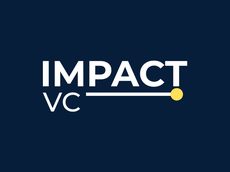
Investing in Impact Venture
In 2023, we made three new investments with a value of £13.5 million, including Bethnal Green Ventures Fund II – the fund achieved a first close of £33 million with co-investors including the British Business Bank and M&G. The fund aims to support up to 100 start-ups via BGV’s flagship tech-for-good programme.
Since inception BSC has made:
- 23 venture fund commitments managed by 15 managers
- £126 million capital committed
- Representing 14% of our portfolio
Venture Portfolio – Impact on people highlights
The following table provides an overview of the actual impact that our Impact Venture investment portfolio is currently contributing to.
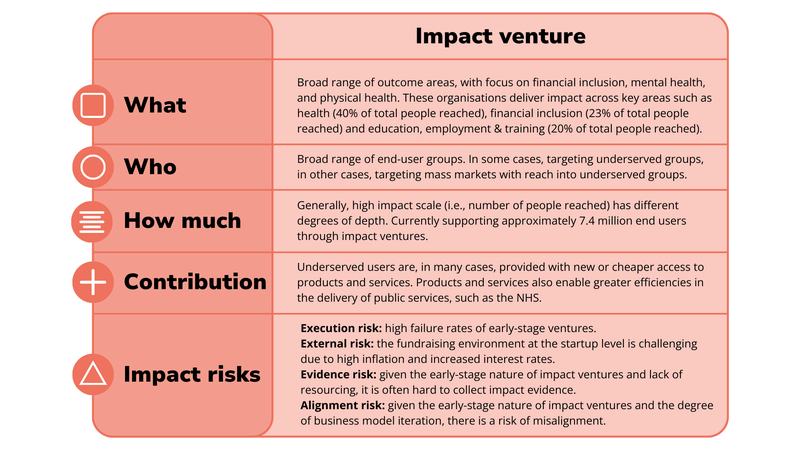
Eka Ventures
In 2020 BSC invested in Eka Fund I, the largest impact-driven, early-stage, venture capital fund in the UK (£68m), to address the urgent need and opportunity to use the power of science, data and technology to build a better economy.
Eka Ventures shares our belief that purpose-led startups can deliver social change, and is building its firm on the premise that impact and financial return can go hand in hand.

Social lending
Helping build a social lending market that meets the needs of a diverse range of social purpose organisations and investors alike.
We are building thriving social lending markets where investors can find opportunities that align with their values, and social purpose organisations can find the right finance at the right time to fuel their work improving people’s lives across the UK. These organisations deliver impact across key social issues such as financial inclusion , housing and local facilities and employment, education and training and are addressing critical societal challenges such as the Just Transition.
The social lending market system provides a range of lending products to social purpose organisations (SPOs), spanning small loans, charity bonds and social bank loans. Many of these enterprises work in some of the most disadvantaged communities across the UK and, with the right type of finance from mission-aligned lenders, can grow their impact and organisational resilience.
Market-building in social lending
In the social lending market, there can be a disconnect between the financing needs or business models of enterprises supporting underserved communities, and the requirements of investors who have the capital needed to grow this market. This creates challenges for the growth and sustainability of the fund managers that are experts in providing finance to enterprises. These challenges are exacerbated by barriers faced by more diverse-led organisations and those operating in areas of higher deprivation. Growth in the market reflects where there is greatest alignment between the needs of enterprises and investors: over a ten-year period, the strongest growth has been in social banks and charity bonds, while development and sustainment of the non-bank lending market have been underpinned by building the blended finance market through Access – The Foundation for Social Investment and others
Our market building strategies over the last 12 months have focused on:
Influencing policy-makers to use policy levers (such as tax reliefs) and public capital (such as guarantees and grants for blended finance) to mobilise private capital
Collaborative policy efforts such as the Community Enterprise Growth Plan have secured additional dormant assets, ensured the government’s Recovery Loan Scheme guarantee works for charities, and improved terms of Community Investment Tax Relief. [These are attracting new institutional investors to enable sectors like CDFIs to scale up – eg CIEF II.]
Engage with investors to unlock catalytic capital and mobilise commercial capital through blended finance
In 2023 rapidly rising interest rates and severe cost-of-living pressures have placed pressure on some business models’ resilience, while increasing the returns that many investors are looking for and slowing fundraising. Against this backdrop, BII successfully launched Fund IV with new investors into impact such as Beazley and Aspen.
Better understand the barriers of diverse and under-represented groups and SPOs to access social lending
The Addressing Imbalance programme is improving our understanding of the barriers that need to be addressed in partnership with others, to expand the diversity and reach of social lending, with 80 participants in the Investment Committees of the Future Initiative.
Social Investment Business - Recovery Loan Fund
BSC worked with Social Investment Business (SIB) to establish the £25 million Resilience and Recovery Loan Fund during the early stages of the pandemic. This initiative assisted nearly 80 social sector organisations in sustaining their services.

Investing in social lending
In 2023, we made five new investments in social lending funds with a total value of £22.6 million. These investments tackle specific missions and are both seeding new investment solutions and scaling more proven strategies, for example:
- Energy Resilience Fund (Key Fund and SIB): Social enterprises, charities and community enterprises are struggling with rising energy bills, yet can lack the finance and expertise for cost-reducing energy efficiency measures. The Energy Resilience Fund will provide blended finance and technical support to help address the vulnerability of SPOs to energy price volatility and strengthen their resilience.
- BII Fund IV: BII has recognised a market gap for medium-sized, asset-backed SPOs in Care, Housing and Social Infrastructure, that are seeking to grow to meet growing social needs. The fund provides unitranche loans, a solution tailored to the needs of organisations that would otherwise be able to access the amounts of finance needed only through complex deals with multiple finance providers.
Since inception BSC has made:
- 56 social lending fund commitments
- £368 million capital committed
- Representing 40% of our portfolio
Social lending portfolio – Impact on people highlights
The following table provides an overview of the actual impact that our social lending investment portfolio is currently contributing to.
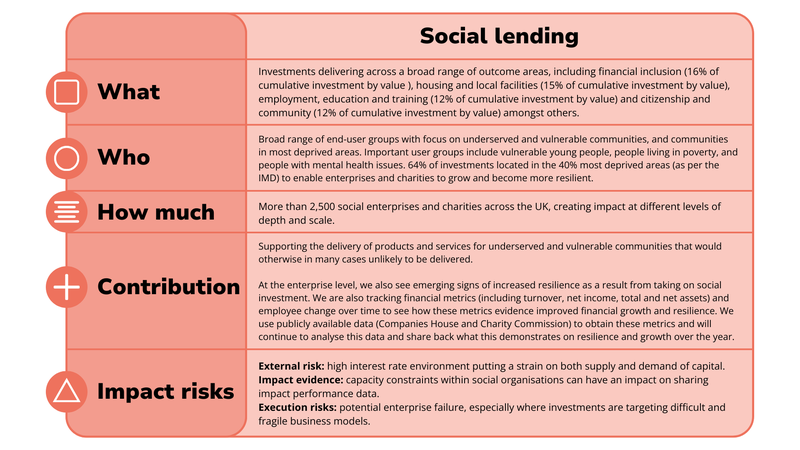
Spotlight: Enterprise Level Impact framework
In 2020 BSC worked with several fund managers to co-develop a shared framework, to better understand the effect of investments on the enterprises’ resilience and growth. Identifying the types of organisations using social investment and what they are using he investment for enables us to better target growth and identify gaps in the market.
The dashboard below provides an overview of the reasons why enterprises take on social lending.

This content is not visible because you have denied third-party cookies. Update your cookie settings and refresh the page to interact with this element.
Over time we will be tracking and assessing the impact on organisational resilience, through measuring organisations’ changes in financial metrics including turnover, net assets, total assets and net income over the term of the loan. We will also track, through self-reported survey data, how the investment has impacted the resilience and growth of organisations.
Social Outcomes Contracts
Helping build a market that improves the lives of people with complex needs, while creating better value in public service delivery.
We are building the social outcomes contracts (SOCs) market to create better outcomes for individuals with complex needs, and better value for government in public service delivery. An outcomes-based approach can lead to better flexibility in delivery, more accountability and better collaboration.
Social enterprises and charities often lack the upfront working capital or risk appetite to deliver social outcomes contracts. These organisations need flexible funding to deliver their services, in advance of outcomes payments being made. Capital from socially motivated investors, who are repaid only if outcomes are achieved, can help bridge this gap.
Market building in SOCs
Continuing the growth of the market and delivering impact to highly vulnerable individuals hinge on several key factors. Many politicians and civil servants are not aware of what SOCs are or the value they can bring, or were operating under common misapprehensions, such as that SOCs are overly complex or that private investors generate outsize returns from them.
While other barriers do exist, such as ensuring social enterprises and charities understand the value SOCs can provide to them and their beneficiaries, crowding in sufficient levels of investments, and building a fund manager landscape able to absorb that investment, these are all contingent on bringing in additional government support. Many politicians and civil servants are not aware of what SOCs are or the value they can bring, or were operating under common misapprehensions, such as that SOCs are overly complex or that private investors generate outsize returns from them.
Our main strategies therefore focus on this aspect of the system:
Targeted engagement of key people within central and local government and the major parties
We have built significant relationships with key individuals across areas where outcomes partnerships can be most effective. This resulted in a small allocation of £37.5 million in the Spring Budget by Treasury, to fund innovative initiatives to help people into work, but this has yet to translate into actual projects or match the scale of our ambition.
Knowledge sharing across stakeholders to socialise the benefits of SOCs
We have continued to create and share content (such as a deep dive on the role SOCs could play tackling complex health issues and key data on public benefit and impact created at system level for government and individuals and have attended (and presented at) key events and roundtables.
Coalition building to amplify the message and build champions for SOCs outside BSC
We are making progress, especially in the health sector through working with the NHS Confederation. We have also built more significant partnerships with think tanks and other agencies, eg E3M Local Commissioners’ Group, Future Public Services Taskforce with Demos, and others. We see the need to do more to bring in delivery partner and commissioner voice to these coalitions.
Spotlight: Quantifying the impact of SOCs
Our vision for the SOCs market is based on the belief that SOCs can deliver significant impact and better outcomes for individuals with complex needs, and better value for money for government. We commissioned a report which shows for the first time how over the last decade, the Social Outcomes Contracts market has grown and added significant value to thousands of individuals facing complex social issues.

Investing in SOCs
Our most recent investment, made in 2018, was in Bridges Social Outcomes Fund II. This is currently the only SOC fund in the UK that is still actively investing. We have not made any new investments pending further government commitments to outcomes-based contracting.
Since inception BSC has made:
- 13 fund and direct commitments in SOCs
- £44 million capital committed
- Delivering outcomes for at least 45,000 people
- Representing 5% of our portfolio
Social outcome contracts portfolio - Impact on people highlights
The following table provides an overview of the actual impact that our SOCs investment portfolio is currently contributing to:
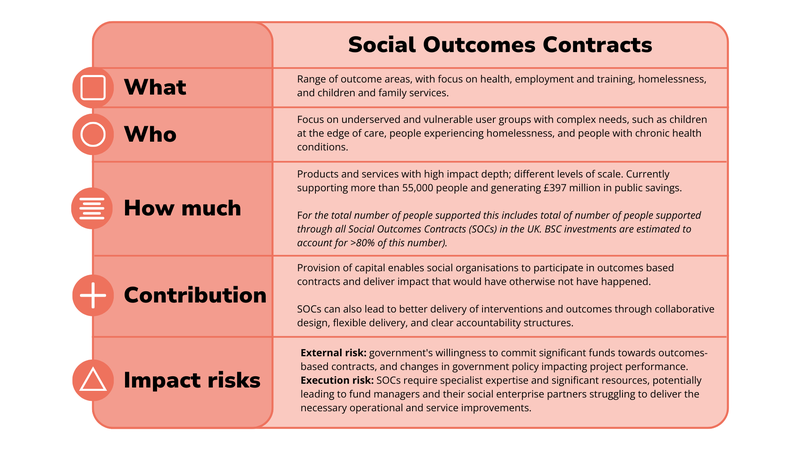
Bridges Social Outcomes Fund II (SOF2)
The follow-on Bridges Social Outcomes Fund II includes contracts across children’s services, homelessness and health and social care, tackling some of society’s most entrenched issues with a focus on those with the most complex needs.

Social property
Helping build a housing market ecosystem that creates more safe, secure and affordable homes for everyone to access, regardless of their circumstances, particularly for the most vulnerable people in our communities.
Our goal is to increase the supply of good-quality, social and affordable housing in the UK, particularly for the most vulnerable. The UK has a housing crisis, which is affecting people across the income spectrum, but particularly those who are most vulnerable. Tackling the chronic shortage of social and affordable housing requires an estimated £16.9 billion every year for the next ten years. And government figures show that more than 100,000 households including over 130,000 children are in temporary accommodation, the highest figure since records began. Local authorities are close to bankruptcy as they struggle to house families in need – with councils in England paying £1.7 billion per year for temporary accommodation.
Impact-driven private capital has a vital role to play in increasing the supply of social and affordable homes, and its contribution has been increasing since 2011, growing from virtually zero to £5.1 billion. Private impact capital is actively involved in three primary segments: General Needs Social and Affordable Housing, which supports low-income households in accessing quality, secure and affordable homes; Specialist Supported Housing, addressing the demand for specialised housing for individuals requiring additional support; and Transitional Supported Housing (TSH), ensuring those in crisis and facing homelessness have access to safe and appropriate transitional housing, supporting their transition to stable, independent living.
Market-building in social property
We have identified several structural factors within the investment ecosystem, that either pose barriers or present opportunities. Firstly, investors perceive the sector as complex and high risk, often stemming from a limited understanding of the underlying business models. Secondly, housing partners, charities and social enterprises are sometimes wary of new forms of private capital entering the market, due to a lack of transparency and consistency in impact practices and measurement across the industry. Lastly, the market’s relatively nascent stage means that a visible track record is not always evident to stakeholders, further influencing perceptions and decisions within the evolving landscape.
Our market building strategies over the last 12 months have focused on:
Educating and influencing investors to invest in the highest impact models
We engaged with investors with more than £500 billion AUM and industry press to share knowledge on impact business models, risks, mitigants and opportunities. Targeted engagement with Local Government Pension Schemes led to more than £140 million of co-new investments against a challenging macroeconomic backdrop.
Promoting and showcasing best-in-class impact models and practice as a signal of what’s possible
In partnership with DLUHC and Manchester Metropolitan University, we launched a longitudinal study on homelessness investment, while our review of the Equity Impact Project highlighted an opportunity for ongoing sector utility.
Influencing policy-makers and partners to help grow the market with integrity and quality
Increased public affairs engagement, including providing expertise and evidence to a Parliamentary Select Committee (The finances and sustainability of the social housing sector – oral evidence). This builds on our experience of delivering for and with government: £25 million of catalytic capital from DLUHC to help scale the homelessness impact models, which has levered in a further £123 million of private investment.
Spotlight: Property portfolio analysis
We carried out some analysis to better understand how our property investment portfolio is performing against its strategic impact objectives of addressing the structural under supply of affordable housing and providing homes for those in greatest need.

Investing in Social property
In 2023 we made two investments in social property with a value of £16.75 million, focused on scaling up innovative high-impact models in Transitional Supported Housing (TSH), while also developing new funds that will attract institutional capital:
- Social and Sustainable Housing II: The housing market in the UK does not provide safe and affordable housing for vulnerable people in the quantity or quality they require. Some charities face considerable hurdles, such as cash shortage, when attempting to purchase or acquire additional properties. BSC invested £6.75m as a follow-on investment into SASC’s second property fund, which aims to support the scaling of a high-impact business model with charities.
- Octopus Affordable Housing Fund: A social housing shortfall is resulting in 130,000 children living in temporary accommodation in England. Meanwhile, building new homes has become increasingly challenging, due to rising costs and a housing association sector under pressure to focus its resources on improving existing stock. BSC has invested £10m into the fund, which will target long-term strategic equity partnerships with housing associations, to deliver affordable and energy-efficient housing for low-income households.
Since inception, BSC has made:
- 20 fund commitments in social property
- £237 million capital committed
- 6,690 homes to be delivered across the UK
- Representing 25% of our portfolio
Social property portfolio – Impact on people highlights
The following table provides an overview of the actual impact that our Social Property investment portfolio is currently contributing to.
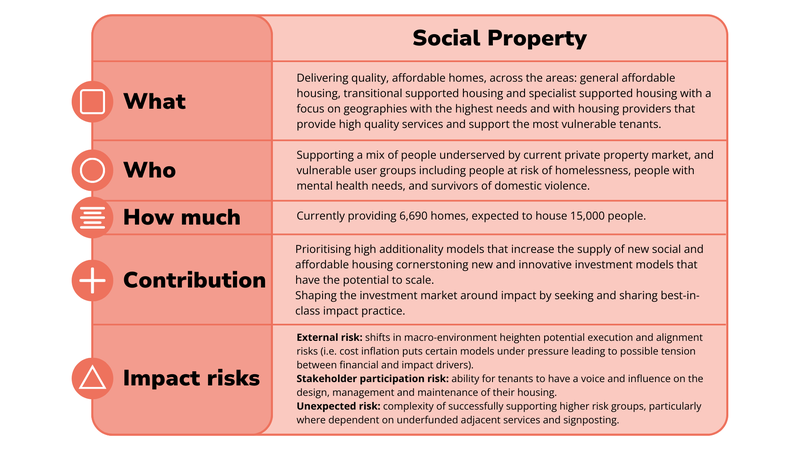
Social and Sustainable Capital (SASC) – Social and Sustainable Housing (SASH) Fund
The SASH Fund provides finance for social enterprises and charities with a track record of both delivering support and managing property. It generates positive social outcomes by providing support services to vulnerable people such as those fleeing domestic abuse, children leaving care or ex-offenders.

